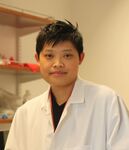
Himisha Beltran, MD
Principal Investigator
Dr. Beltran is a medical oncologist and physician scientist focused on understanding mechanisms of treatment resistance in prostate cancer and lineage plasticity during cancer evolution. She is an Associate Professor of Medicine in the Department of Medical Oncology in the Lank Division of Genitourinary Oncology and the Division of Molecular and Cellular Oncology at DFCI and Harvard Medical School. Her lab has specifically focused on the mechanisms underlying the development of neuroendocrine prostate cancer, an aggressive subtype of advanced prostate cancer. Dr. Beltran is also the Correlative Science Committee Chair for the Alliance for Clinical Trials in Oncology GU Committee and plays an active role in several national and international committees and programs including ASCO, ESMO, as well as team science projects such as the SU2C-PCF Dream Team and PCF SELECT. She serves as Director of Translational Research with Medical Oncology at DFCI, Director of the PROFILE program, Co-Director of the Center for Cancer Genomics (CCG), and co-PI of the DF/HCC Prostate Cancer SPORE. Dr. Beltran works closely with a multidisciplinary team to translate new scientific discoveries into the clinic in the form of biomarker-driven therapeutics to improve patient care.
Select Honors
Publications: Please visit here.
Harvard Catalyst
Principal Investigator
Dr. Beltran is a medical oncologist and physician scientist focused on understanding mechanisms of treatment resistance in prostate cancer and lineage plasticity during cancer evolution. She is an Associate Professor of Medicine in the Department of Medical Oncology in the Lank Division of Genitourinary Oncology and the Division of Molecular and Cellular Oncology at DFCI and Harvard Medical School. Her lab has specifically focused on the mechanisms underlying the development of neuroendocrine prostate cancer, an aggressive subtype of advanced prostate cancer. Dr. Beltran is also the Correlative Science Committee Chair for the Alliance for Clinical Trials in Oncology GU Committee and plays an active role in several national and international committees and programs including ASCO, ESMO, as well as team science projects such as the SU2C-PCF Dream Team and PCF SELECT. She serves as Director of Translational Research with Medical Oncology at DFCI, Director of the PROFILE program, Co-Director of the Center for Cancer Genomics (CCG), and co-PI of the DF/HCC Prostate Cancer SPORE. Dr. Beltran works closely with a multidisciplinary team to translate new scientific discoveries into the clinic in the form of biomarker-driven therapeutics to improve patient care.
Select Honors
- Elected Member, American Society for Clinical Investigation (ASCI)
- Helen Trailblazers Award, Helen Gurley Brown Foundation
- Alliance Scholar Award in Honor of Dr. Emil "Tom" Frei III
- Damon Runyon Cancer Research Foundation Clinical Investigator Award
- Prostate Cancer Foundation Young Investigator Award
Publications: Please visit here.
Harvard Catalyst

Martin Bakht, PhD
Research Fellow
PhD - University of Windsor (Canada)
E-mail: [email protected]
My work focuses on the impact of lineage plasticity on molecular imaging targets in prostate cancer.
Awards:
1. Bakht MK et al. Differential expression of glucose transporters and hexokinases in prostate cancer with a neuroendocrine gene signature: a mechanistic perspective for FDG imaging of PSMA-suppressed tumors. Journal of Nuclear Medicine (2019)
2. Bakht MK et al. Neuroendocrine differentiation of prostate cancer leads to PSMA suppression. Endocrine-Related Cancer (2019)
3. Bakht MK et al. Identification of alternative protein targets of glutamate-ureido-lysine associated with PSMA tracer uptake in prostate cancer cells. Proc Natl Acad Sci (2022)
4. Bakht MK et al. Landscape of prostate specific membrane antigen heterogeneity and regulation in AR-positive and AR-negative metastatic prostate cancer, Nature Cancer (2023)
Research Fellow
PhD - University of Windsor (Canada)
E-mail: [email protected]
My work focuses on the impact of lineage plasticity on molecular imaging targets in prostate cancer.
Awards:
- DoD PCRP Early Investigator Research Award
1. Bakht MK et al. Differential expression of glucose transporters and hexokinases in prostate cancer with a neuroendocrine gene signature: a mechanistic perspective for FDG imaging of PSMA-suppressed tumors. Journal of Nuclear Medicine (2019)
2. Bakht MK et al. Neuroendocrine differentiation of prostate cancer leads to PSMA suppression. Endocrine-Related Cancer (2019)
3. Bakht MK et al. Identification of alternative protein targets of glutamate-ureido-lysine associated with PSMA tracer uptake in prostate cancer cells. Proc Natl Acad Sci (2022)
4. Bakht MK et al. Landscape of prostate specific membrane antigen heterogeneity and regulation in AR-positive and AR-negative metastatic prostate cancer, Nature Cancer (2023)

Candi Deblay, MBA
Executive Support Specialist to Dr. Beltran
MBA – Indiana University of Pennsylvania
Email: [email protected]
Executive Support Specialist to Dr. Beltran
MBA – Indiana University of Pennsylvania
Email: [email protected]

Hiroshi Hongo, MD, PhD
Research Fellow
MD – Keio University School of Medicine (Japan)
PhD – Keio University School of Medicine (Japan)
Email: [email protected]
I am exploring mechanisms of drug resistance in aggressive variant and neuroendocrine prostate cancer.
Awards:
Research Fellow
MD – Keio University School of Medicine (Japan)
PhD – Keio University School of Medicine (Japan)
Email: [email protected]
I am exploring mechanisms of drug resistance in aggressive variant and neuroendocrine prostate cancer.
Awards:
- The Uehara Memorial Foundation Fellowship
- Young Investigator Award, Keio University School of Medicine Alumni Association (Sanshikai)
- The 109th Japanese Urological Association (JUA) Annual Meeting Award
- The 108th JUA Annual Meeting Award
- The 76th JUA Sakaguchi Prize
- American Urological Association (AUA) 2018 Annual Meeting Best Poster Award
- Hongo H et al. Discovery of a new candidate drug to overcome cabazitaxel-resistant gene signature in castration-resistant prostate cancer by in silico screening. Prostate Cancer Prostatic Dis. 2023
- Hongo H et al. BRCA2 mutation in a case of aggressive prostate cancer accompanied by spinal bulbar muscular atrophy. Asian J. Androl. 2022
- Hongo H et al. Topoisomerase II alpha inhibition can overcome taxane-resistant prostate cancer through DNA repair pathways. Sci Rep. 2021
- Hongo H et al. Analysis of cabazitaxel-resistant mechanism in human castration-resistant prostate cancer. Cancer Sci. 2018

Min Jin Kim
Lab Technician
BS - University of California, Los Angeles (UCLA)
I am investigating the use of circulating tumor DNA from liquid biopsies to detect castration-resistant prostate cancer.
Lab Technician
BS - University of California, Los Angeles (UCLA)
I am investigating the use of circulating tumor DNA from liquid biopsies to detect castration-resistant prostate cancer.

Sheng-Yu Ku, PhD
Research Fellow
PhD - State University of New York at Buffalo (Roswell Park Cancer Institute)
Email: [email protected]
My research uses patient-derived organoids, mouse models, and xenograft models to study treatment-related neuroendocrine differentiation and lineage plasticity in advanced prostate cancer. One of my projects is to study the role of the Notch signaling pathway in NEPC and to develop new treatments to intervene.
Awards:
Research Fellow
PhD - State University of New York at Buffalo (Roswell Park Cancer Institute)
Email: [email protected]
My research uses patient-derived organoids, mouse models, and xenograft models to study treatment-related neuroendocrine differentiation and lineage plasticity in advanced prostate cancer. One of my projects is to study the role of the Notch signaling pathway in NEPC and to develop new treatments to intervene.
Awards:
- Prostate Cancer Foundation Young Investigator Award
- DoD PCRP Early Investigator Research Award
- Sheng-Yu Ku, Spencer Rosario, Yanqing Wang, Ping Mu, Mukund Seshadri, Zachary W. Goodrich, Maxwell M. Goodrich, Eduardo Cortez Gomez, Jianmin Wang, Bo Xu, Charles L. Sawyers, Leigh Ellis, David W. Goodrich Rb1 suppresses prostate cancer metastasis and lineage plasticity underlying castration resistance Science (2017)
- Ping Mu, Zeda Zhang, Matteo Bebelli, Wouter Karthaus, Elizabeth Hoover, John Wongvipat, Sheng-Yu Ku, Chi-Chao Chen, Dong Gao, Zhen Cao, Neel Shah, Elizabeth Adams,Wassim Abida, Philip A. Watson, Chun-Hao Huang, Elisa De Stanchina, Scott Lowe, Leigh Ellis, Himisha Beltran, Mark A. Rubin, David Goodrich, Francesca Demichelis, and Charles L. Sawyers SOX2 promotes lineage plasticity and antiandrogen resistance in TP53 and RB1 deficient prostate cancer Science (2017)

Nishat Manzar, PhD
Research Fellow
PhD – Indian Institute of Technology Kanpur (India)
E-mail: [email protected]
My research focuses on identifying the key molecular players and mechanisms underlying prostate cancer metastasis in advanced-stage patients.
Awards:
Research Fellow
PhD – Indian Institute of Technology Kanpur (India)
E-mail: [email protected]
My research focuses on identifying the key molecular players and mechanisms underlying prostate cancer metastasis in advanced-stage patients.
Awards:
- AACR Women-in-Cancer Research Scholar Award
- Tiwari, R., Manzar, N., et al., 2020. Androgen deprivation upregulates SPINK1 expression and potentiates cellular plasticity in prostate cancer. Nature Communications, 11(1), p.384.
- Manzar, N., et al, 2023, January. Transcription networks rewire gene repertoire to coordinate cellular reprograming in prostate cancer. In Seminars in Cancer Biology.

Kei Mizuno, MD, PhD
Research Fellow
MD – Kyoto University (Japan)
PhD – Kyoto University (Japan)
Email: [email protected]
I am interested in understanding molecular evolution of NEPC using bioinformatics analysis of cell-free DNA.
Awards:
Research Fellow
MD – Kyoto University (Japan)
PhD – Kyoto University (Japan)
Email: [email protected]
I am interested in understanding molecular evolution of NEPC using bioinformatics analysis of cell-free DNA.
Awards:
- The Uehara Memorial Foundation Fellowship
- Japan Society of the Promotion of Science Fellowship
- Mizuno K et al. eVIDENCE: a practical variant filtering for low-frequency variants detection in cell-free DNA. Sci Rep (2019)
- Mizuno K et al. Clinical Impact of Detecting Low-Frequency Variants in Cell-Free DNA on Treatment of Castration-Resistant Prostate Cancer. Clin Cancer Res (2021)

Adam Presser, MS
Lab Manager
MS - Clarkson University
E-mail: [email protected]
I am studying epigenetic changes and lineage plasticity in castration-resistant prostate cancer.
Lab Manager
MS - Clarkson University
E-mail: [email protected]
I am studying epigenetic changes and lineage plasticity in castration-resistant prostate cancer.

Varadha Balaji Venkadakrishnan, PhD
Research Fellow
PhD - Cleveland State University (Cleveland Clinic)
Email: [email protected]
I am interested in understanding mechanisms of treatment-resistance and developing novel therapeutic strategies for AR- indifferent prostate cancer.
Awards
Research Fellow
PhD - Cleveland State University (Cleveland Clinic)
Email: [email protected]
I am interested in understanding mechanisms of treatment-resistance and developing novel therapeutic strategies for AR- indifferent prostate cancer.
Awards
- National Cancer Center Fellowship
- DoD PCRP Early Investigator Research Award
- Prostate Cancer Foundation Young Investigator Award
- Venkadakrishnan VB et al. AR-dependent phosphorylation and phosphoproteome targets in prostate cancer. Endocrine-related Cancer (2020)
- Venkadakrishnan VB et al. Protein kinase N1 control of androgen-responsive serum response factor action provides rationale for novel prostate cancer treatment strategy. Oncogene (2019)
- Venkadakrishnan VB, Yamada Y, Weng K, Idahor O, Beltran H. Significance of RB Loss in Unlocking Phenotypic Plasticity in Advanced Cancers. Mol Cancer Res (2023)

Lisa Wei, MSc
Computational Biologist
BS – University of British Columbia (Vancouver, Canada)
MSc – University of British Columbia (Vancouver, Canada)
Email: [email protected]
I am exploring the utility cell-free DNA methylation for the detection and characterization of different subtypes of castration-resistant prostate cancer.
Computational Biologist
BS – University of British Columbia (Vancouver, Canada)
MSc – University of British Columbia (Vancouver, Canada)
Email: [email protected]
I am exploring the utility cell-free DNA methylation for the detection and characterization of different subtypes of castration-resistant prostate cancer.

Kenny Weng
CURE Scholar Student
CURE Scholar Student
Lab Alumni
HOME | RESEARCH | LAB TEAM | PUBLICATIONS | NEWS | VIDEOS | SUPPORT US | CONTACT
©2022 Beltran Lab at Dana-Farber Cancer Institute
©2022 Beltran Lab at Dana-Farber Cancer Institute

